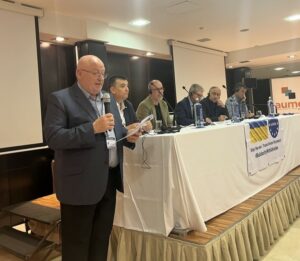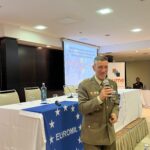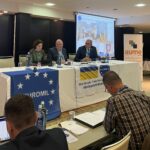EUROMIL holds its 128th General Assembly Meeting in Spain
On 26-27 October 2023, EUROMIL held its 128th General Assembly meeting in Spain (Madrid), hosted by our member association AUME.
 EUROMIL President, Emmanuel Jacob opened the conference by welcoming members while also thanked AUME for the cooperation in organizing the General Assembly meeting in Madrid. On 26 October, a panel discussion focused on the doctrine of the citizen in uniform and its implementation in Spain took place, under the moderation of Mariano Casado, Vice-President of the Military Life Observatory. In this regard, Emmanuel Jacob stressed that the concept of citizen in uniform underlines the idea that members of the armed forces are not just uniformed professionals, but they are also integral parts of the broader society they serve.
EUROMIL President, Emmanuel Jacob opened the conference by welcoming members while also thanked AUME for the cooperation in organizing the General Assembly meeting in Madrid. On 26 October, a panel discussion focused on the doctrine of the citizen in uniform and its implementation in Spain took place, under the moderation of Mariano Casado, Vice-President of the Military Life Observatory. In this regard, Emmanuel Jacob stressed that the concept of citizen in uniform underlines the idea that members of the armed forces are not just uniformed professionals, but they are also integral parts of the broader society they serve.
The panel shed light on recent events that underline the need for reform. Notably, an agreement signed by the government to ensure equal pay for AFs and Civil Guards was not fulfilled. Trade unions had to step in to negotiate, highlighting the disparity between the laws in place and the evolving societal norms. In some cases, changes in laws do not keep pace with changes in society.
Iñaki Unibaso, Secretary General of AUME (Asociación Unificada de Militares Españoles), emphasised the importance of support from organisations like EUROMIL. He stressed that military personnel are first and foremost citizens. In the aftermath of Spain’s history of dictatorship, the 1975 Spanish constitution was enacted. However, it left military personnel with limited rights of unionism. This has led to a significant gap between the military and civilian society’s evolution. Iñaki Unibaso argued that the fundamental right to unionise is the key to bridging this gap. While recent developments have allowed the creation of military associations, the distinction between unionism and associationism remains a challenge.
Juan Fernández, Secretary General of AUGC (Asociación de Guardias Civiles), stressed the need for change in Spain’s democracy. He expressed the desire to transform military associations into trade unions. He highlighted that military personnel, while acknowledging their role as public servants, still face limitations in terms of their rights. The fear of breaking away from discipline is a major obstacle. Improved conditions for military personnel would not only benefit them but also enhance the quality of services they provide to the public.
Pepe Álvarez, Secretary General of UGT (Unión General de Trabajadores), drew attention to the situation from the perspective of Spanish citizens. He argued that the Armed Forces are often seen as an enigmatic entity, a perception that needs to change. He highlighted the challenging conditions faced by lower-ranked military personnel, who often work far more than a 40-hour work week. Mr Álvarez stressed the importance of granting military workers the right to trade unions to defend their rights as workers. The progress in achieving gender equality and the increased participation of women in the Spanish Armed Forces represent positive developments, especially when compared to other NATO member states. However, it’s crucial to recognize that issues of discrimination still demand attention. The Armed Forces play a pivotal role in ensuring the safety of citizens and taking on an increasingly vital role in responding to the growing frequency of natural disasters. Spain’s plans to allocate a substantial budget for military expenditure promise to enhance national defence capabilities. However, this should go along with improving the working conditions and addressing social concerns within the Armed Forces. Mr Álvarez highlighted how key issues such as safety, healthcare, and the administration of justice remain challenges in Spain. The current military justice system falls short in safeguarding and effectively monitoring the fundamental right to a fair defence. Therefore, the imperative of reforming and strengthening the military justice system has to be tackled.
Unai Sordo, Secretary General of CCOO (Confederación Sindical de Comisiones Obreras), stressed the unique conditions of military workers, emphasising the need to break away from the historical anomalies that have constrained their rights. He echoed the importance of reinforcing military associations and supporting their journey towards unionism. Mr Sordo called for the integration of the military into the democratic system and their active participation in serving the common welfare.
On 27 October, the General Assembly welcomed BG Benítez, representative of the Spanish Minister of Defence, and Col Lucero to talk about Women, Peace and Security (WPS) Agenda. To begin with, BG Benítez presented the priorities of the Spanish presidency of the Council in the areas of Common Security and Defence Policy (CSDP), by highlighting the importance of the Strategic Compass, or the MILEX-23 live exercise under the Rapid Deployment Capacity that took place in Spain, or other defence initiatives as PESCO. Besides, BG Benítez stressed the importance of the space strategy, which is set to be adopted by the Council in November, as well as climate change and security.
To continue, Col Lucero focused on WPS, especially on violence that girls and women are suffering when during armed conflict. EU and NATO policies aiming at gender mainstreaming were also presented, but the speakers underlined the utmost importance of raising awareness, which is not about teaching but about changing minds.
The General assembly Meeting continued throughout the order of business, most notably with the approval of the Spanish association, AUGC , with observer status at EUROMIL.
Colleagues from the Ukrainian association, UUMS participated at EUROMIL’s General Assembly and also shared their thoughts, fears and hopes on the situation in their country. More precisely, it was underlined that the majority of UUMS’ tasks now are focusing on supporting the families of military personnel, providing mental health support, and ways for reintegration into the civilian life. 
The meeting continued with the presentation of the national reports of EUROMIL members and the outcome of the regional meetings that took place earlier that day. Overall, the members exchange views on issues of common concern, as recruitment and retention in the Armed Forces, the changing geopolitical environment posing emerging threats and challenges, and ways forward.
The day’s events closed at 17.30 and members will meet again in Lisbon (Portugal) in April 2024 for the 129th General Assembly meeting.

